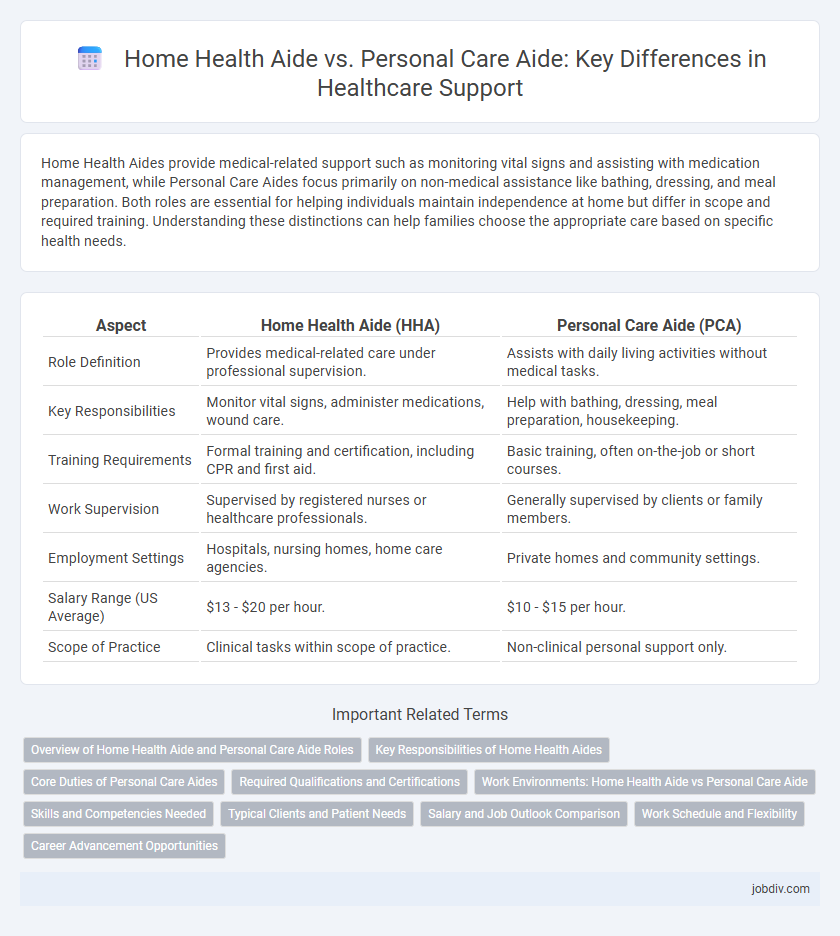Home Health Aides provide medical-related support such as monitoring vital signs and assisting with medication management, while Personal Care Aides focus primarily on non-medical assistance like bathing, dressing, and meal preparation. Both roles are essential for helping individuals maintain independence at home but differ in scope and required training. Understanding these distinctions can help families choose the appropriate care based on specific health needs.
Table of Comparison
| Aspect | Home Health Aide (HHA) | Personal Care Aide (PCA) |
|---|---|---|
| Role Definition | Provides medical-related care under professional supervision. | Assists with daily living activities without medical tasks. |
| Key Responsibilities | Monitor vital signs, administer medications, wound care. | Help with bathing, dressing, meal preparation, housekeeping. |
| Training Requirements | Formal training and certification, including CPR and first aid. | Basic training, often on-the-job or short courses. |
| Work Supervision | Supervised by registered nurses or healthcare professionals. | Generally supervised by clients or family members. |
| Employment Settings | Hospitals, nursing homes, home care agencies. | Private homes and community settings. |
| Salary Range (US Average) | $13 - $20 per hour. | $10 - $15 per hour. |
| Scope of Practice | Clinical tasks within scope of practice. | Non-clinical personal support only. |
Overview of Home Health Aide and Personal Care Aide Roles
Home Health Aides (HHAs) provide medical-related assistance such as monitoring vital signs, administering medications, and supporting rehabilitation under nurse supervision. Personal Care Aides (PCAs) focus on non-medical tasks, including helping clients with daily living activities like bathing, dressing, and meal preparation. Both roles are essential in home care settings but differ primarily in the scope of medical responsibilities and certification requirements.
Key Responsibilities of Home Health Aides
Home Health Aides provide medically oriented support such as monitoring vital signs, administering medications, and assisting with physical therapy exercises under the supervision of healthcare professionals. They perform tasks including wound care, managing medical equipment, and observing patient conditions to report changes promptly. These responsibilities distinguish Home Health Aides from Personal Care Aides who primarily offer assistance with daily living activities like bathing, dressing, and meal preparation.
Core Duties of Personal Care Aides
Personal care aides primarily assist clients with daily living activities such as bathing, dressing, grooming, and mobility support to enhance their quality of life. They monitor vital signs, administer medications under supervision, and provide companionship to improve emotional well-being. Personal care aides often work in private homes, offering personalized support tailored to individual health needs and preferences.
Required Qualifications and Certifications
Home Health Aides typically require completion of a formal training program approved by state agencies and may need certification such as the Certified Nursing Assistant (CNA) to provide medical-related services. Personal Care Aides usually have fewer formal qualifications, emphasizing on-the-job training and may not require certification, as their role focuses on non-medical assistance like bathing, dressing, and housekeeping. Both positions must comply with state-specific regulations, but Home Health Aides generally work under the supervision of healthcare professionals and need more stringent credentials to perform clinical tasks.
Work Environments: Home Health Aide vs Personal Care Aide
Home Health Aides typically work in patients' homes, providing medical care such as monitoring vital signs and administering medications, often under a nurse's supervision. Personal Care Aides primarily assist with daily living activities like bathing, dressing, and meal preparation in home settings or assisted living facilities, focusing on non-medical support. Both roles demand adaptability to varied home environments, but Home Health Aides engage more frequently with clinical tasks in private residences.
Skills and Competencies Needed
Home Health Aides require comprehensive skills in medical monitoring, including vital signs assessment and medication management, alongside knowledge of basic nursing tasks. Personal Care Aides focus primarily on assisting with daily living activities such as bathing, dressing, and mobility support, emphasizing empathy and communication abilities. Both roles demand strong interpersonal skills, patience, and the ability to follow care plans accurately to ensure client well-being.
Typical Clients and Patient Needs
Home Health Aides primarily serve clients with complex medical conditions or disabilities requiring skilled nursing care, medication management, and assistance with activities of daily living. Personal Care Aides typically support elderly or disabled individuals who need help with non-medical tasks such as bathing, dressing, meal preparation, and light housekeeping. Both roles address patient needs for safety, comfort, and improved quality of life, but Home Health Aides handle more clinical responsibilities tailored to chronic illness management.
Salary and Job Outlook Comparison
Home Health Aides earn an average annual salary of $27,000, with a projected job growth rate of 34% from 2022 to 2032, reflecting high demand due to aging populations. Personal Care Aides typically make slightly less, around $25,000 per year, but share a similar robust job outlook with a growth projection near 33%. Both roles offer substantial employment opportunities in the health care sector, driven by increasing elderly care needs and in-home support services.
Work Schedule and Flexibility
Home Health Aides often have more structured work schedules, typically aligned with medical appointments and patient needs, resulting in consistent shifts and less variability. Personal Care Aides usually experience greater flexibility, with schedules that can vary daily or weekly based on client preferences and non-medical assistance requirements. Both roles require adaptability, but Personal Care Aides generally have more opportunities for customized and part-time work arrangements.
Career Advancement Opportunities
Home Health Aides often have broader opportunities for career advancement through specialized certifications in medical care, enabling roles such as Licensed Practical Nurse (LPN) or Registered Nurse (RN) with additional education. Personal Care Aides typically focus on non-medical assistance, limiting their career growth primarily within support roles or supervisory positions in caregiving agencies. Pursuing further training in healthcare or obtaining credentials like CPR and first aid can enhance job prospects and earning potential for both professions.
Home Health Aide vs Personal Care Aide Infographic

 jobdiv.com
jobdiv.com